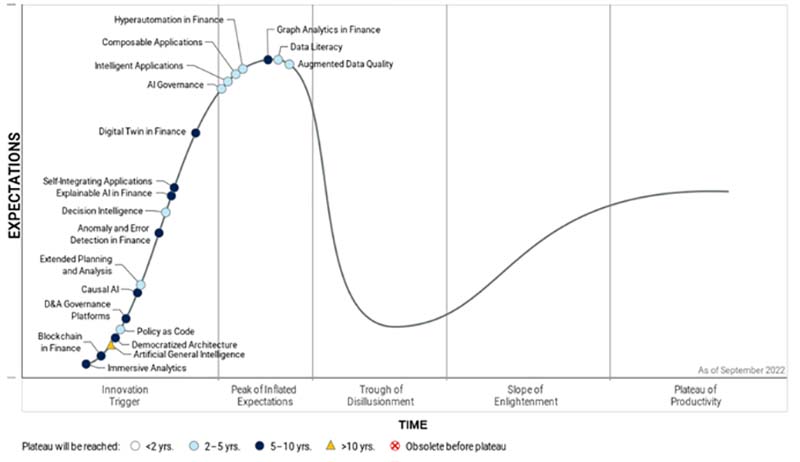The finance function is changing quickly – with the support of new technologies, particularly artificial intelligence (AI) and machine learning (ML) – into an environment where people and machines collaborate to transform finance and business capabilities, drive process efficiency, and automate data pipelines, according to Gartner.
“A future autonomous finance organization will require people and machines to work together in a learning loop,” says Mark McDonald, senior director: research in the Gartner Finance practice. “People will exercise judgment, perform controls, validate output and ensure financial integrity while machines will focus on the analytical work and repetitive processes that, comparatively, humans struggle with.”
The Hype Cycle introduces finance leaders to the technology themes underpinning the concept of autonomous finance, that will drive the cycle of technology evolution in finance over the next decade.
Gartner Hype Cycle for Emerging Technologies in Finance, 2023

Source: Gartner (November 2022)
“There are three broad themes to the technologies on this hype cycle,” says McDonald. “Firstly, there are technologies, such as decision intelligence, that drive effective and efficient organizations.
“Secondly, there are a group of transformational technologies, such as composable applications, that can drive new digital business capabilities.
“Thirdly, there are technologies, such as augmented data quality, that automate the collection, storage and retrieval of data and increases accuracy.”
Given that only evolving and future-looking technologies are included in the Hype Cycle for Emerging Technologies in Finance, 2023, Gartner experts recommend that finance leaders are selective: picking out the trends that align best to their organisational needs, develop short- and long-term roadmaps to align finance to developing trends, and allow their organisations to evolve gradually.
“Begin with small steps and lower-risk iterations not only to avoid big mistakes but to give the finance organisation time for such gradual evolution,” says McDonald. “Over time, iterative cycles of improvement will cover a broader range of processes and responsibility.”
In this year’s Hype Cycle for Emerging Technologies in Finance, three technology innovations stand out as being on a path to mainstream adoption within five years and having transformational potential for the finance organisation.
Composable applications
In a departure from the monolithic and inflexible technology applications commonly associated with enterprise technology, composable applications have arisen in response to greater demand for business adaptability in more volatile times.
Composable applications, which are at the Peak of Inflated Expectations, are modular in nature and are built to support fast, safe, and efficient application changes in the face of frequent disruption and new opportunities. The improved agility of business technology drives resilience and adaptability throughout the business.
Composable applications are built as flexible compositions of well-packaged modules of business application capabilities. The “composers” tend to be a business-IT fusion team while the creators of the modules may be application vendors or central IT software engineering teams.
Decision intelligence
Decision intelligence (DI) is at the Innovation Trigger of the Hype Cycle. DI is a practical discipline used to improve decision making by explicitly understanding and engineering how decisions are made, and how outcomes are evaluated, managed and improved via feedback.
The current hype around automated decision making and augmented intelligence, fueled by AI techniques in decision making has revealed the brittleness of legacy business processes in this new environment.
An increasingly complex business environment, with an increasingly uncertain pace of business, and ever more decisions taken by machines have created a sense of unease from the human and also regulatory perspective. There is a need to transparently represent how decisions are being made.
From a pure business perspective, it makes sense to curtail unstructured ad-hoc decisions that are siloed and disjointed, and properly harmonise collective decision outcomes across an entire organisation. Software tools are now emerging that will enable organisations to practically implement DI projects and strategies.
Intelligent applications
ERP rollouts of the last decades focused on collecting transactional data. Now, finance organisations are burdened by the quantity of information collected and don’t know how to analyse or use it.
A new breed of software vendors is introducing intelligent applications (IAs), which are entering at the Peak of Inflated Expectations. These applications are augmented with AI and connected data, from transaction and external sources, to generate a system that provides contextualised features, experiences, and processes, and can continually learn, improve and adapt.
The promise of such platforms is that finance can spend more time on business support and use limited in-house AI resources to build business-specific AI-driven solutions.
